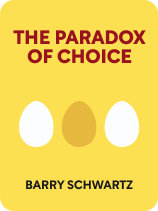

This article is an excerpt from the Shortform book guide to "The Paradox of Choice" by Barry Schwartz. Shortform has the world's best summaries and analyses of books you should be reading.
Like this article? Sign up for a free trial here .
What is an opportunity cost? How do opportunity costs affect decision-making?
An opportunity cost is when you need to consider all options to put a decision into context. This affects your ability to make a decision, because it means you need to make a trade-off in order to make a decision. People don’t like making trade-offs, because they lead to three psychological blocks: indecision, emotional stress, and excessive justification.
Continue reading to learn about opportunity costs, decision-making, and how to work through indecision.
Defining Opportunity Costs
In his book The Paradox of Choice, Barry Schwartz writes that, when making decisions, we consider our options in relation to one another. No option exists in isolation. This is where opportunity costs come into play: When making an important choice, you need to consider the benefits of your alternatives to obtain a full, accurate picture of your decision. Many people don’t consider opportunity costs, instead focusing on the individual choice they plan to make. By not fully considering their decision, they leave open the possibility of making a mistake.
While the benefits of considering opportunity costs are clear, Schwartz notes that overthinking opportunity costs can make us dissatisfied with our ultimate decision. For example, imagine a student, Alan, who is choosing which college to attend to study art. College #1 is a small, private college with an excellent academic reputation and a quiet social life, College #2 is a large public university with good academics and vibrant parties, and College #3 is a prestigious conservatory that would give him excellent artistic training, but would require significant dedication and would not allow him to pursue other interests.
Alan picks College #1, because he likes the close-knit community of the school and the academic opportunities it offers. Even though he’s made a good decision, he doesn’t feel fully satisfied with his choice because he feels he’s missing out on the social life of College #2 and the opportunity to hone his craft offered by College #3.
People who stress over opportunity costs might feel dissatisfied in the end because they worry that they haven’t made the objectively correct decision, or that there could have been a perfect option they haven’t considered. Schwartz argues, however, that opportunity costs are entirely subjective. There is no objectively correct decision, just the right decision for the chooser.
(Shortform note: Many decisions do have objectively positive or negative outcomes—for instance, if you choose to save money by eliminating doctor’s visits, you’ll end up with poor health. While Schwartz’s argument is valid in that we make many decisions based on feelings, it’s important to be more aware of objective outcomes when making choices in areas like health and finances.)
In a society with expanded choice, opportunity costs can be particularly stressful given the excess options available.
How Opportunity Costs Affect Our Decision-Making
Schwartz points out that, when we make decisions with opportunity costs in mind, we make trade-offs. Even if the choice you ultimately make is the best option for you, you have to accept that you won’t get the benefits of the options you passed up. This is how opportunity costs affect decision-making.
Dealing with trade-offs causes stress, adding to the challenges of making complex decisions. People don’t like making trade-offs, whether the stakes are high or low. It’s unpleasant and demoralizing to think about all of the other options you’ll be giving up when you make a choice. Think about the example of Alan choosing a college—even though he made a good decision, the trade-offs made him feel unsatisfied.
The aversion to making trade-offs leads to psychological blocks that prevent us from making good complex decisions. Schwartz describes three psychological blocks: indecision, emotional stress, and excessive justification.
| Re-Evaluating Trade-Offs You might think of trade-offs as a one-time consideration: You think about trade-offs only until you’ve made your final decision. However, decisions with long-term consequences might require you to re-evaluate the trade-offs. For instance, imagine you took a job with a low salary because you liked the location. Three years later, you want to move to a larger apartment, and you’ve gotten tired of the city you’re living in. You made the trade-off three years ago and it worked for you then, but now it would benefit you to reconsider this trade-off and make a new choice. |
1. Indecision
Schwartz notes that one psychological block is indecision. Distinguishing among several options is more difficult than distinguishing between two. Schwartz argues that we’re biologically inclined to make simple decisions on whether something will benefit or harm us, not to make complex decisions on what’s best among a large group of acceptable options.
Multiple attractive options make many people want to avoid making decisions altogether. Schwartz cites studies implying that, when faced with one clearly superior option and one clearly inferior option, people can easily pick the superior option. However, when another high-quality option is thrown into the mix, a greater proportion of people decide not to make a decision at all.
Dealing with a trade-off is stressful enough to cause people to postpone or cancel a decision. This is true in both low-stakes decisions, like deciding among products to buy, and in high-stakes decisions, like those involving health care.
Schwartz adds that the ability to reverse decisions we make can also cause indecision. When walking away is an option, we may become less confident in our decisions, since there’s no motivation to stick with them.
| Working Through Indecision Many people struggle with indecision. In an advice column published by The Guardian, a reader wrote about struggling between options much longer than was feasible. She sometimes spent so much time considering the trade-offs between two options that she lost both opportunities. The columnist, ethicist Eleanor Gordon-Smith, gave similar advice as Schwartz’s: Since it’s impossible to know the “correct” choice in advance, it’s best not to stew over trade-offs for too long, and if multiple options are appealing, it’s perfectly fine just to pick one. |
2. Emotional Stress
Emotional stress can also block us from making well-thought-out complex decisions. People tend to make worse decisions when they feel worse emotionally.
Schwartz explains that when we feel negative emotions, we tend to focus on individual facets of the decision instead of the full picture, or we train our energy on our bad emotions instead of on the decision. Conversely, we tend to make good decisions when we’re feeling good.
This creates a catch-22: Complex decisions make us feel bad because of the number of trade-offs at hand. It then becomes difficult to decide—and if the decision itself makes you feel bad, you’ll be ill-equipped to choose effectively.
| Stress and Binary Thinking Another negative impact of stress on decision-making is that it makes us think in binaries. Our brains simplify problems for us when we’re stressed, so complex decisions can start to seem more black-and-white. For example, if a student’s stressed out about an upcoming exam, they might study for it all night, or they might not study at all. The better choice would probably be to study for a few hours and get a good night’s sleep, but stress can override decisions that aren’t firmly on one side of a binary. If you’re feeling stressed and facing a decision, it might help to take a step back and consider whether there are more nuanced solutions than you’re considering. |
3. Excessive Justification
Schwartz writes that when a decision is high-stakes, we feel the need to justify it. However, we can’t always accurately judge why we make the decisions we do. In reality, thinking about our reasons for making choices can alter the choices themselves.
When we try to justify our decisions, we can have a hard time verbalizing our reasoning, which tempts us to just change our decision to something that’s easier to explain. As the complexity increases, the impulse to justify our decisions increases. We may end up with an unanticipated, unsatisfying decision once we try to justify it, even if our original decision would have been fine.
| The Problem of Limited Knowledge One of the main circumstances where we have trouble justifying our decisions is when we know little about the area we’re making a decision in. For example, if someone knows little about theater, they’d probably have a hard time explaining their preference for one play over another. Studies have suggested that this effect doesn’t happen as much when you have expertise. A professional director would probably have a much easier time analyzing their own preferences and explaining why they liked or disliked a play, since they’re confident thinking and talking about plays. So while you might not need to worry about justifying a decision in an area you’re knowledgeable in, it could benefit you to restrain yourself from over-justifying a choice in an area you’re not an expert in. |

———End of Preview———
Like what you just read? Read the rest of the world's best book summary and analysis of Barry Schwartz's "The Paradox of Choice" at Shortform .
Here's what you'll find in our full The Paradox of Choice summary :
- Why the more choices we have, the more stressed and indecisive we feel
- How to better navigate our choices, from groceries to health insurance
- Whether it's better to seek the best or accept "good enough"






